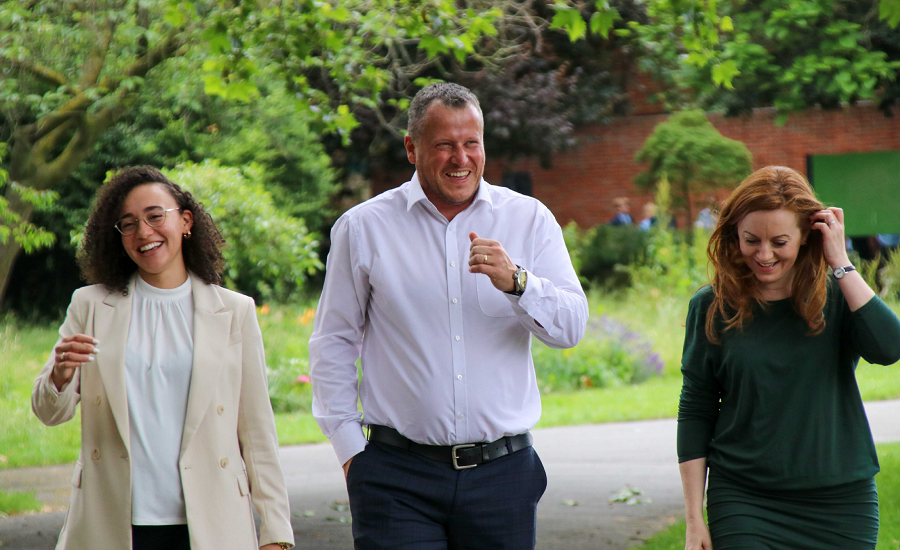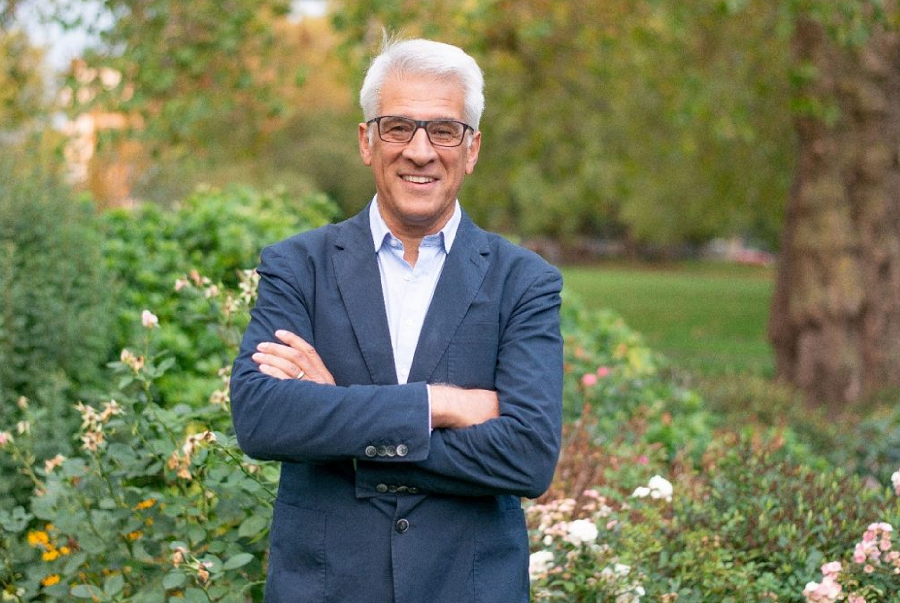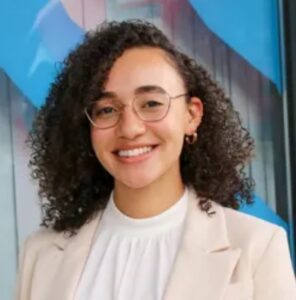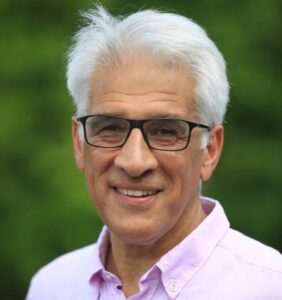
It is not often that we can claim that true innovation is underway, but with the dawn of the Oasis Restore secure school, this really is a legitimate statement. The first secure school in England and Wales will be in operation from 2023 and is committed to truly revolutionising how the Youth Justice system approaches the education and support of young people in its care. We were so delighted to talk to Reverend Steve Chalke, founder of the Oasis Charitable Trust and the newly formed Executive Team at Oasis Restore – Andrew Willetts, Dr Celia Sadie and Cara Beckett.
Can you each tell us a bit about your individual roles and what you bring to Oasis Restore?
Andrew: I am Principal Director at Oasis Restore and my main role is to identify and drive the organisation’s vision, mission and strategy. This will help develop a positive and supportive culture to thrive and empower the wider leadership team in the delivery of the learning and enrichment, care and wellbeing and staff development programmes. I am the registered individual which gives me statutory responsibility for the school and all the young people we are educating and supporting.
My whole career has involved working with children and families in various different Educational, NHS and Youth and Care settings. My love and passion has always been Youth Justice and that has run through all of my work and made me aware for some time that the custody arrangements do not create the best systems for children to thrive or for staff to feel safe in their practice.
Before I joined Restore I was involved with a national group who were asked to reconsider what youth custody could be like and I was asked to be the South East lead to come on this working group. That was the initial concept of the secure school and what that could be. Once I was involved in that programme I knew that it was for me and I had to see this become a reality.
When I heard that Oasis Charitable Trust would deliver the secure school and I knew a bit more about Steve Chalke (Founder and Leader) and the type of person he is and the organisation he runs, it felt like this was completely the right match. Custody is a wicked issue and a real, real challenge, but I felt with the strength of Oasis, the knowledge and understanding of how to deliver outstanding education through its Academies and with its community youth work programmes and family work it seemed the perfect delivery organisation. The Oasis ethos and values align so much with mine that it felt the perfect opportunity to bring some of my expertise and sprinkle some of the magic from Oasis. With this team it really will be something special and we have to give a special mention to Clare Wilson (the Programme Director).
This role combines my passion and experience and is being delivered by an organisation that can really commit to the change. If it had been won by another organisation or private company it is unlikely that I would have applied.
Cara: I am Director of Learning and Enrichment – which means I focus on developing curriculum pathways for the children – both core and vocational offers and also into the enrichment programme which is about further development of the child and giving them the space to enjoy. It is about looking at not only academic improvements and plugging gaps with their learning but also developing them further when they transition for journey out of Restore they can transition to employment, education, apprenticeships, higher education. The enrichment side is about exposing their interests – likes, dislikes, what they enjoy doing and developing healthy habits and join clubs.
I am trained as a teacher and my second placement was with Oasis. I wasn’t going to continue in education after I trained but I fell in love with Oasis and the ethos, values and vision. I have now been with Oasis for the last seven years The values align so well with how I was raised and I am also completely passionate about delivering really good education to the children in our care.
Initially, I was working in Ponder’s End which is the fifth most deprived borough in London and I wanted to do better with the children and I found I was able to develop really strong relationships with them.
I am Caribbean and grew up in Barbados and we have a strict way of dealing with children, but at the same time my family is really very loving. I feel this background has instilled my very loving, boundary-based approach to building really strong relationships which has helped me to deliver really good educational outcomes for them. I wanted to widen that reach so I moved into teacher training within Oasis and then its school improvement team for looking at developing and delivering the curriculum and the pedagogy and neuroscience which underpins that.
My passion was always about doing better and serving those most at risk or deprived so when I saw this role come up it just felt absolutely perfect for me. It was a long process coming into post and being appointed but I was adamant that all of the gaps in my learning, not having worked in the sector before, my healthy naivety about what the justice system looks like for our children would be outweighed by my passion and drive to deliver better outcomes . I believe in education hugely and the opportunities it provides for the children and the access to options to deliver that to a really high standard is what I am really passionate about for this role.
“About 60-70 per cent of children leaving custody in the UK reoffend or are reconvicted and we obviously want to do something about that.”

Celia: My role is Director of Care and Wellbeing and this feeds into the whole design of the school and the therapeutic framework around which we think about looking after the children, how we design the system and how we embed psychological thinking across the whole programme. My role also involves responsibility for the NHS contract who we partner with to provide a really good healthcare provision and the design of what we offer therapeutically. But really it is working with Cara and Andrew thinking about what the school should be like for psychological staff and the children.
My route to this job has been all based on my passion for clinical psychology. I was around 12 when I realised I wanted to be a clinical psychologist. I was always choosing books to read about people and how they were surviving difficult circumstances and it just really fascinated me. From that point onwards I was really motivated and started gathering experience however I could during my teens and I went to night school during school. It has worked out well thankfully and while it is not as glamorous as I might have imagined that is good as it is about being with people where they are and not transplanting your views on to them.
At the beginning of my career I trained as a psychologist and worked in a lot of in-patient units with young people which is the most exciting, thrilling, painful and dramatic experience. I completely loved it and did that for a long time. I then took a job at Cookham Wood Young Offenders’ Institution and was specialising more and more. It felt like an amazing experience to be with the young people where they were and to try and relieve some of the pain they were experiencing. I led a wonderful team there and we expanded to look after more institutions.
I gained a lot of experience working in custody and with the young people who end up there and the staff who are there. My job became about developing a therapeutic culture in the prison and that is quite a huge challenge systemically and it was thrilling to apply myself to it but also very complex as it is about trying to make little adaptations to a system that is very established. I did that for a long time and when the Oasis job came up it was going to take a lot to tempt away from the NHS as I was really committed to the public service role.
I was only going to leave for something unique and inspiring but the vision for Restore which Steve Chalke and Clare Wilson offered was so compelling and really aligned with my own philosophy as a professional and what I believe it is that helps children that I couldn’t turn it down. It feels like everything has been building towards this. It is an opportunity to create something from scratch that works as a whole system itself rather than having to tinker with things that already exist and that is an amazing opportunity. It is almost a once in a generation opportunity that has come along which is so different and revolutionary. It is a real privilege to get this job and work with this team.
The emphasis on the person-centred, individual approach has been highlighted for students. Can you share why this is important and how you will bring this into the schooling environment?
Celia: The individual, human element is something easily lost in institutional environments and so a huge priority for us is thinking about the experience of the child as they move through this quite traumatic process in Youth Justice of being sentenced and separated from their families and communities. The whole time we have been designing this curriculum we have been thinking about what would make it a genuinely caring, nurturing environment and re-humanising experience. We have thought carefully about what we can do to restore a sense of hope, dignity and self-belief. Those are the principles that have guided us, supported by our Oasis principles of: relationships, discovery and community. Those elements are really what humans need to feel good and help them reach their potential and flourish; that has underpinned the whole ethos and approach of the school.
Cara: The concept of discovery and process of learning something about yourself and about others, about who you are and who you are becoming as a result of such an holistic approach to care is what Restore will offer. We look at developing the whole person academically, vocationally, morally, spiritually, physically – we have the unique opportunity here to develop mentally and emotionally too. We want to offer them the environment where they feel safe and willing and able to embark on a process of learning. We are looking at how we develop them as a whole rather than in silos. This will come, we believe, through an integrated programme: everything here has been designed from scratch to enable this. The better part of this year has been spent with me and Celia working together, almost merging our brains to come away with what we know is true and right and will really benefit the children, and of course, the staff. We want them to be on a journey as well. When we are thinking about our cornerstones, thinking about a wholeness.
“We have the ambition that we will be recruiting staff with lived experience and we will champion that within our work.”
Andrew: In essence it is treating children as children. We need to show love and care to the whole child including that of their wellbeing. They have committed a crime and been held to account – their punishment is the sentence. We won’t add additional layers of punishment to this process: our responsibility to them is to heal and restore.
We are going to be relentlessly aspirational for these children, and ensure that the moment they committed a crime isn’t the point which defines who they are for the rest of their lives. Our mission is ‘to transform the life chances of children in the criminal justice system, through nurturing a therapeutic and educational community that embeds hope, stability and opportunity beyond Oasis Restore. Oasis Restore creates an environment that gives the children, and the organisation, every opportunity to reach their full potential and be the best they can be.

Andrew – As Principal in this first of its kind school in the UK – what is your ambition for the organisation in its first year?
The initial year is focused on recruiting brilliant staff who also share and reflect our values/vision and training them to make sure they are ready. It is going to be a fantastic opportunity but also going to be hard work. We will put a framework in place and then it is about delivering on our operational specification to demonstrate that our holistic, integrated care can deliver outcomes and improvement in learning and education.
In 2023-24 we will start to welcome children into our school. Our plan is to ensure that 100 per cent of the children will have access to health services and therapy when needed and that every one will leave Restore with a plan which developed six months prior to them leaving us. Too many children leave custody currently who don’t know their plan days, if not hours, before leaving the gate.
We are looking to completely transform the arrangements for resettlement and transition and we are working with the Association for Directors of Children’s Services, the Association for YOT Managers the NHS and others to make sure that we are creating a system that makes key decisions much earlier and in the best interest of the children. We need to establish and embed the culture that shares our vision, mission and values and makes sure that we are looking towards creating our legacy.
Our longer term plan is to become a ‘centre of excellence’ and leading the changes across the youth estate creating potentially future secure schools, or supporting new arrangements for the delivery of care, wellbeing and education for children in need of help and support.
Celia – what role does psychology and therapy play in this type of educational setting?
We have taken an holistic approach to embedding psychological thinking in our policies and processes, in the design of the environment and the timetable, and in aspects of the curriculum and staffing mix. There is a saturation of psychological thinking and research from the field which is running into everything we are doing.
As we go move forward that will come into the recruitment process, and training and care of our new staff. I am really acutely aware of how difficult it is to work in locked secure settings, with children who have gone through a great deal of trauma and are continuing to go through a great deal of different trauma through the separation from their families. Staff need a great deal of nurturing to survive that and practise safely within it. It is really my intention to build systems around the staff which allow opportunities for support and reflection and the care and valuing of staff. This will then allow them to provide the most loving and nurturing attitude to the children.
The other element is for the children themselves. It is vitally important that they each have access to therapy of whatever type feels best to them and suits their particular needs and ways of engaging. I am hoping that we can have freedom to supply that in whatever form that works – whether that is out on the football pitch or in the therapeutic gardens or playing games or being in a group. Whatever feels important is what we need to be providing. The evidence base is fairly thin as this is such a specialised and rare cohort. So, we have the opportunity to really innovate and draw on ideas from international examples. We want the flexibility to meet the children where they are and that means establishing a really wide range of what therapy and how we offer it.
Currently the statistics suggest that about 60-70 per cent of children leaving custody in the UK reoffend or are reconvicted and we obviously want to do something about. That requires really deep thinking about what can move their trajectory in a different direction and what support their families and communities need. We also need to think about what support the victims of these crimes need – for them to all make amends and live with themselves afterwards.
Cara – does the curriculum differ to other secondary school settings and if so how and why?
Children are going to come to us at different places in their learning. It is likely that most will have disengaged with learning at some point and our role is to meet them where they are and understanding their needs, strengths, weaknesses and interests.
For the curriculum we are looking at creating a vocational offer as well as the core academic pathway. That will vary by child as their ages vary too from aged 12-17 and we want them to be able to transition back into education if needed. We don’t want gaps in their learning so we really will be tailoring it around the child with a very skilled workforce to deliver that while still focusing on upskilling too. We don’t want anyone to feel out of their depth delivering this curriculum.
For many of the older ones it would be at a point when they would be preparing to go into the work force, an apprenticeship or higher education. When designing the curriculum we have focused on making sure they have the tools to enter that effectively. It is about building an education around them and their future aspirations. We want to deliver specific pathways, skills and qualifications that will be required to allow them to enter different industries and have careers. Our goal is to reduce the reoffending rate so they can effectively transition back into their communities and remain there with something they have built up and can do when they leave.
The intentionality behind our approach is the plugging of academic and learning gaps and building confidence in how they feel about themselves as a learner as well as a human being. We are looking at really small class sizes and specialised support to meet the resource needs for the children.
The children will be in school 9-3pm Monday to Friday all week, but they will have enriching opportunities available 365 days of the year. This is to ensure the development of the wholeness of the child and we will be developing relationships with the children and giving them the opportunity to learn and discover through experience.
It is also important that we look at ongoing staff development and will be integrating our teams so that expertise is well shared. Mainstream education staff are going to come in with limited understanding with how to meet the particular needs of a child – that is more because in training you don’t specialise in this area – but having the healthcare team available to help with upskilling and sitting with them to talk about what is best for the child and working together as a team will be fundamental. We are dealing with really complex scenarios and we are aware that it will expose even more complexity for our staff too being in those environments. We absolutely do want to become a school of excellence and want to attract the best teachers and staff team available.
“We won’t add additional layers of punishment to this process: our responsibility to them is to heal and restore.”
What are your longer term hopes for the ‘secure school’ model?
Andrew: We want to become a school of excellence and we can only do that with 49 places. Ultimately, we want to create a hope within the system that things can be better for these children in need of help and support.
In the longer term we want to create a model and practice of care, which truly demonstrates an approach working well to then encourage other schools to be opened and make sure that we can offer access to as many children who need it. With the growth of the model into other areas within the system, we do hope that it will bring reflection and encourage or motivate systemic change more broadly.
We are being intentional with the design of the space, for example, one of our family rooms is all about small more intimate space with a kitchen, family room and a dining room to make it feel more relaxed and child-centred. We want to make the visiting families feel more relaxed and at home as they have a huge role to play too. We have a responsibility to reduce trauma for the children, their families and the siblings.
We want children to come back and see us– we have the ambition that we will be recruiting staff with lived experience and we will champion that within our work.
We believe that if children are supported much earlier they won’t need to be placed in custody in the first place. Prevention needs to be the focus for all of us.
Relationships, discovery and community are three core pillars of Oasis Restore – how do they work together to benefit the students, staff and their communities?
Cara: Oasis has run 52 schools before us and we are not differentiating ourselves from those schools as their vision for education is in line with our own. We are all Oasis. The focus remains on three really important Hebrew principles – Rabbi, Yaddah and Shalom – which are at the core and founding of Oasis. Rabbi is the relationship element – a guide and inspirational role model, bringing knowledge, wisdom and understanding to Restore and the relationships with the children. Yaddah is the discovery cornerstone – it is about knowing, perceiving and offering hands-on-learning, and taking lessons from the gains and the losses. Shalom is the community element and is all about wholeness and peace and nothing being missed out. That is the Oasis vision and that runs through the Restore approach too.

The Oasis Charitable Trust was founded in 1985 by Reverend Steve Chalke. Its was borne out of Steve’s ambition and vision, first realised as a 14 year old growing up in central London with an English mother and Indian father – neither of whom had much education nor money, but who encouraged their son to have aspiration and follow his ambition and dreams to help, support, believe in and restore other people.
Steve studied theology aged 21 and by the time he was 29 had realised the vision of his 14-year old self and formalised Oasis as a charity and opened its first assisted living house in London. He commented on this: “Slowly I learned that while a homeless person really does need a bed, what they need more is a sense of self worth, stable housing and a different inner voice.” He has come to articulate this as needing a ‘meaning-making narrative’ and this concept resonates across all the work he and the team at Oasis does.
When asked about the impact Oasis has had from an educational perspective, Steve comments: “Oasis exists to build healthy communities where everyone is included and can make a contribution and fulfil their God-given potential. We are a community development organisation with many strands which means we can be as inclusive as possible. Education has always been a fundamental part of that and we have extended the Oasis offering beyond the UK work extensively in India and now into Africa.”
In early 2018 Oasis applied to run the first secure school in England and to the charity’s delight it was given the chance. Steve tells us what the inception of the secure school – Oasis Restore – means: “This is one of the greatest legislative changes since the abolition of capital punishment. Legislation had to change to bring about the birth of this school. This isn’t just an idea or concept of a school; this restorative, developmental care is now enshrined in law.”
He continues: “We called it ‘Restore’ because it is about restoration, not retribution. It is also the first time in British History that a charity can run a custodial estate. Law has been changed to allow a not-for-profit to do this.
“In my view it is also a revolution in terms of our understanding – it is our justice system leaping from the 19th century into the 21st century. We are learning that physical and psychological punishment are not the best ways to deal with humans. We have the worst reoffending juvenile rates in Europe. We have a 69 per cent reconviction rate in the first year of people leaving juvenile custody and we send people back to the environment where they were criminalised alienated and not cared for in the first place. Through Oasis Restore the approach is entirely different to that.”
The age range at Oasis Restore is from 12-17 and a significant percentage will be 16 and 17 year olds. In terms of sentence length there are three strands – those who are on remand; those who have been sentenced; and then there are also those serving life sentences.
There are three existing settings – Youth Offender Institutes; Secure Training Centres; Secure Children’s Homes and the Secure School is the fourth option available to the Youth Custody Service.




